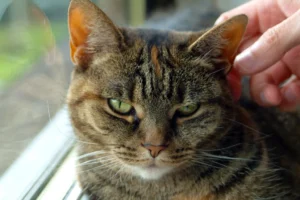Does your male cat seem clueless when it comes to mating? Are you puzzled as to why he doesn’t seem to know what to do in the presence of a female feline? Let’s explore the reasons behind this behavior and what you can do to help your furry friend.
Male Cat Mating Behavior: Understanding the Basics
Male cat mating behavior is a natural instinct guided by a variety of factors. One key aspect is the influence of hormones, particularly testosterone, which drives your male cat’s urge to mate. This urge can lead to behaviors like vocalizations, spraying, and restlessness. Additionally, cats have unique mating rituals that involve courtship and territorial marking to attract potential mates.
However, some male cats may struggle with mating due to various reasons. Health issues, such as infections, injuries, or genetic conditions, can affect their ability to mate successfully. Socialization plays a crucial role as well – if a male cat has had limited exposure to other cats or has been neutered at a young age, he may lack the necessary skills to engage in successful mating behaviors.
Understanding these basics can help you support your male cat in navigating his mating instincts. Providing a safe and enriching environment, regular vet check-ups, and opportunities for social interactions with other cats can help improve your cat’s mating behavior and overall well-being.
Signs Your Cat May Have Mating Difficulties
Recognizing potential mating difficulties in your male cat is important for early intervention and support. Keep an eye out for signs such as excessive vocalizations, spraying outside the litter box, aggressive behaviors towards other cats, or displaying signs of distress or frustration.
Physical signs like wounds or injuries from unsuccessful mating attempts, or reproductive issues like infertility, can also indicate underlying mating difficulties in male cats. Additionally, if your cat seems disinterested in mating, avoids other cats, or shows signs of anxiety or fear around potential mates, it may signal a need for further investigation.
If you notice any of these signs in your male cat, consult with your veterinarian to rule out any underlying health issues and discuss potential behavior modification strategies. Addressing mating difficulties early on can help improve your cat’s quality of life and prevent future complications.
Extra Tip: Consider providing your male cat with enriching toys and activities to stimulate his natural instincts and encourage healthy social behaviors with other cats.
Remember, every cat is unique, and it’s essential to approach any mating difficulties with patience, understanding, and proactive care. By staying attentive to your cat’s behaviors and needs, you can help him navigate his mating instincts and thrive in a supportive environment.
Potential Reasons for Mating Incompetence in Male Cats
Male cats can struggle with mating for a variety of reasons. One common explanation is medical issues such as infections or hormonal imbalances. If your male cat is not displaying typical mating behaviors, it could be due to physical discomfort or health concerns. Another possibility is behavioral issues, which can arise from stress, lack of socialization, or a traumatic past. Additionally, inexperienced male cats may simply not know how to approach mating. Lack of exposure to other cats during critical development periods can result in a lack of mating skills.
How to Encourage Proper Mating Behavior in Male Cats
To help your male cat develop the skills needed for successful mating, consider providing opportunities for socialization with other cats. This can help build confidence and familiarity with mating behaviors. Encouraging playtime with other cats can also simulate natural mating behaviors. Additionally, consulting with a veterinarian to rule out any underlying medical issues is crucial. Creating a calm and comfortable environment for your cat can also reduce stress and promote healthy mating behaviors.
Tips for Encouraging Proper Mating Behavior:
- Provide opportunities for socialization: Arrange playdates with other cats to help your male cat learn proper mating behaviors.
- Consult with a veterinarian: Ensure your cat is in good health and address any medical concerns that may be affecting mating abilities.
- Create a calm environment: Reduce stress in your cat’s surroundings to promote natural mating behaviors.
- Encourage playtime: Interactive play with other cats can help simulate mating behaviors and build confidence.
By addressing potential reasons for mating incompetence and taking proactive steps to encourage proper behavior, you can help your male cat develop the necessary skills for successful mating.
Seeking Veterinary Advice for Mating Difficulties
If your male cat is having trouble mating, it’s essential to seek veterinary advice. A veterinarian can help determine if there are any underlying health issues causing the problem. During the visit, the vet may perform a physical exam, run tests, or provide behavioral advice to address the mating difficulties. Remember, it’s always better to be safe than sorry when it comes to your furry friend’s well-being.
Key Tip: Monitor your cat’s behavior closely and note any changes to discuss with the vet.
Interesting Facts About Male Cat Mating Behavior
Did you know that male cats have a unique mating behavior called the Flehmen response? This is when they curl back their lips and inhale deeply to detect pheromones. It’s their way of assessing a female cat’s reproductive status. Male cats also tend to be more vocal and territorial during mating season, marking their territory with urine to attract potential mates. Understanding these behaviors can help you better comprehend why your male cat may be struggling to mate.
Fun Fact: Male cats can engage in mating behaviors, like yowling and spraying, even if they are neutered.
Conclusion: Supporting Your Male Cat’s Mating Journey
Male cats not knowing how to mate can be a common issue, but as a responsible pet owner, there are steps you can take to support and guide your furry friend through this journey.
One way to assist your male cat is by ensuring he is healthy and in good physical condition. Regular visits to the vet for check-ups and vaccinations can help identify any potential health issues that may be affecting his ability to mate.
Additionally, providing a comfortable and stress-free environment for your cat is crucial. Creating a calm and safe space for him to relax and feel secure can help reduce any anxiety or nervousness he may be experiencing.
Furthermore, offering your male cat positive reinforcement and encouragement can go a long way in building his confidence and easing any uncertainties he may have about mating. Patience and understanding are key when supporting your cat through this process.
Moreover, consider seeking guidance from a professional animal behaviorist or veterinarian if your male cat continues to struggle with mating. They can provide expert advice and assistance tailored to your cat’s specific needs.
Remember, every cat is unique, and it may take time for your male cat to learn how to mate properly. By providing support, patience, and understanding, you can help your furry companion navigate this important aspect of his life with confidence and ease.
Helpful Tip: Offer plenty of playtime and mental stimulation for your male cat to help him stay active and engaged, which can also positively impact his overall well-being and mating behavior.
For more detailed information on cat mating behavior, you can refer to this helpful resource: Cat Mating Behavior Guide.
Alex, a passionate animal lover, has experience in training and understanding animal behavior. As a proud pet parent to two dogs and three cats, he founded AnimalReport.net to share insights from animal experts and expand his knowledge of the animal kingdom.




